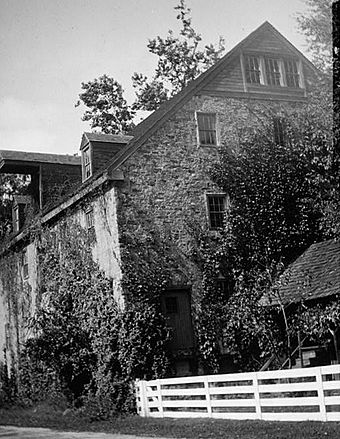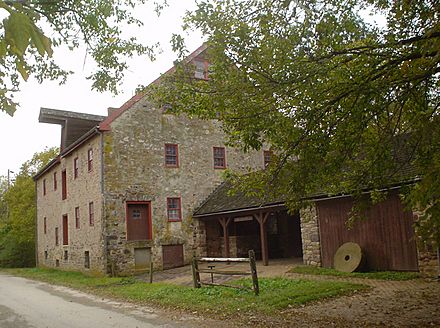Farmar Mill facts for kids
Quick facts for kids |
|
|
Farmar Mill
|
|

Farmar Mill, circa 1936.
|
|
| Location | Fort Washington, Pennsylvania |
|---|---|
| Built | ca. 1690 |
| NRHP reference No. | 72001140 |
| Added to NRHP | May 19, 1972 |
Farmar Mill, also known as Mathers Mill, is a very old building. It used to be a mill, which means it ground grain into flour. The mill got its power from the Wissahickon Creek. You can find it on Mather's Lane, near Skippack Pike (Pennsylvania Route 73), in a village called Whitemarsh, close to Fort Washington, Pennsylvania.
Contents
The History of Farmar Mill
This watermill was built around the year 1690. It was a gristmill, which is a mill that grinds grain. Edward Farmar built it. His father was a British army officer. He lived in Ireland and bought a huge piece of land in Pennsylvania from William Penn. This land was about 5,000 acres. It covered most of what is now Whitemarsh Township.
Edward's father passed away before he could move his family to America. But his mother brought the family over in 1685. They settled in the area we now call Fort Washington.
Important Roads and Trade
Farmar Mill was the starting point for Skippack Pike. This road was created in 1713. By 1722, another road connected Farmar Mill to a ferry on the Neshaminy Creek. This ferry was owned by Richard Saunders. It was located in Bucks County.
New Owners and Big Changes
In 1740, a businessman named Samuel Morris bought half of the mill. He was a Quaker. After Farmar died in 1746, Morris bought the other half. Between 1743 and 1748, Morris was building his large country home. It was called "Whitemarsh Estate." This estate later became known as Hope Lodge. It was very close to Farmar Mill.
After Morris passed away in 1770, his brother Joshua sold the mill. He also sold 4 acres of land with it. Isaac Mather bought it. Isaac's son, Joseph, built the mill building we see today in 1820.
Farmar Mill Today
Farmar Mill is a very important historical site. It is listed on the U.S. National Register of Historic Places. This means it is recognized for its historical value.
Today, Farmar Mill is part of a museum and historic site. It is connected to Hope Lodge. The Pennsylvania Historical and Museum Commission runs this site. The mill building itself is not open to visitors. This is because there are worries about how strong the building is.
 | Mary Eliza Mahoney |
 | Susie King Taylor |
 | Ida Gray |
 | Eliza Ann Grier |




